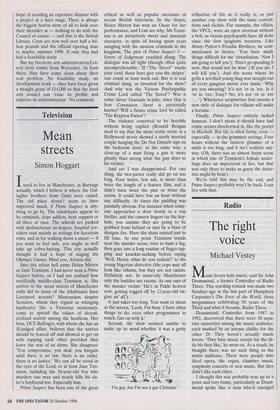Television
Mean streets
Simon Hoggart
Iused to live in Manchester, in Burnage actually, which I believe is where the Gal- lagher brothers from Oasis were raised. The old place doesn't seem to have improved much, if Prime Suspect is any- thing to go by. The inhabitants appear to be criminals, dope addicts, bent coppers or all three at once. The schools are packed with dysfunctional no-hopers, hospital cor- ridors exist mainly as settings for ferocious rows, and as for walking down a street — if you want to feel safe, you might as well take up cobra-baiting. This city actually thought it had a hope of staging the Olympic Games. Mind you, Atlanta did.
Into this urban hell came Helen Mirren as Jane Tennison. I had never seen a Prime Suspect before, so I had not realised how terrifically middle-class Tennison is. She arrives in the mean streets .of Manchester (why did so many of the inhabitants have Liverpool accents? Mancunians despise Scousers, whom they regard as whinging layabouts) like a Victorian missionary, come to spread the values of decent, civilised society among the heathens. Her boss, DCS Ballinger, with whom she has an ill-judged affair, believes that the natives should be fenced off and allowed to get on with topping each other provided they leave the rest of us alone. She disagrees: `You compromise, you deal, you bargain until there is no law, there is no order, there is no justice.' We can all be saved in the eyes of the Lord, or at least Jane Ten- nison, including the 16-year-old boy who murders one man and nearly kills his sis- ter's boyfriend too. Especially him.
Prime Suspect has been one of the great critical as well as popular successes of recent British television. In the States, Helen Mirren has won an Oscar for her performance, and I can see why. Ms Tenni- son is an attractively sweet and innocent character, in spite of having spent years mingling with the nastiest criminals in the kingdom. The plot of Prime Suspect 5 Errors of Judgement crackled along. The dialogue was all right (though often quite incomprehensible: 'If "The Street" marks your card, those boys give you the stripes', one could at least work out. But is it real criminal slang, or invented for the show? And why was the Vicious Psychopathic Crime Lord called 'The Street'? Was it some clever Granada in-joke, since that is how Coronation Street is universally known? Will a future crime lord be called `The Krypton Factor'?
The violence contrived to be horrible without being explicit (Ronald Reagan used to say that the more erotic scene in a Hollywood movie showed a newly married couple hanging the Do Not Disturb sign on the bedroom door; in the same way, a close-up of a man firing a gun is more ghastly than seeing what the gun does to his victim).
And yet I was disappointed. For one thing, the two-parter really did go on too long. Four hours, less ads, is more than twice the length of a feature film, and it didn't have twice the plot or twice the action. It could have lost an hour without any difficulty. At times the padding was painfully obvious. For instance when some- one approaches a door slowly in a cop thriller, and the camera lingers on the key- hole, you assume they are going to be grabbed from behind or met by a blast of shotgun fire. Here the shots existed just to fill time. At one point Tennison stands near the murder scene, tries to bum a fag, then goes into a long routine of finger-tap- ping and knuckle-sucking before saying `Well, Henry, what do you reckon?' to the young Nigerian detective (the cops may all look like villains, but they are not racists. Definitely not. In inner-city Manchester only the baddies are racists. As one says of the murder victim: 'He's in Pakki heaven now, getting togged off by 12-year-old vir- gins, an' all').
It just takes too long. You want to shout at the screen, 'Look, I'm busy. I have other things to do, even other programmes to watch. Get on with it.'
Second, the show seemed unable to make up its mind whether it was a gritty `I'm gay, but I'm not a gay Christian.' reflection of life as it really is, or just another cop show with the same conven- tions and clichés. For example, the villain, the VPCL, wore an open overcoat without a belt, as vicious psychopaths have all done since the first spaghetti westerns. Like Mono) Python's Piranha Brothers, he com- municated in litotes: 'You have made things difficult for me' (translation: 'Now I am going to kill you'); 'Don't go spending it now, that would not be wise' (If you do, I will kill you'). And the scene where he grills a terrified young thug was straight out of every gangster movie ever made: 'Why are you sweating? It's not 'ot in 'ere. Is it 'ot in 'ere, Tony? No, it's not 'ot in 'ere . . . ') Whichever scriptwriter first invents a new style of dialogue for villains will make a fortune.
Finally, Prime Suspect entirely lacked humour. I don't mean it should have had comic scenes shoehorned in, like the porter in Macbeth. But life is often funny, even especially — in the grimmest settings. Four hours without the faintest glimmer of a smile is too long, and it isn't realistic any- way. (Oh, there was an almost funny scene in which one of Tennison's female under- lings does an impression of her, but that was only there to make us guess the detec- tive might be bent.) We're told this may be the end, and Prime Suspect probably won't be back. I can live with that.


















































































 Previous page
Previous page